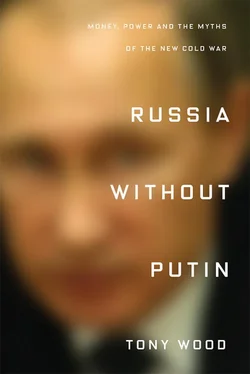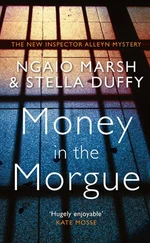as prime minister under Yeltsin, 17–18
in St Petersburg, 13–15
support among intelligentsia for, 80, 81
Rasmussen, Anders Fogh, 130
Remington, Thomas, 38
Roldugin, Sergei, 55
Rotenberg, Arkady and Boris, 30, 55, 118
rouble
1998 crash in value of, 45
speculation in, 33
used by former Soviet states, 118
Rubtsovsk, 95
Russian March (2007), 104
Russian Orthodoxy, 101, 152–54
Russian Socialist Movement, 99
Russo-Georgian War (2008), 1, 105, 113, 131–32, 139, 155, 167
Ryklin, Mikhail, 74
Saakashvili, Mikheil, 131, 176
St Petersburg (Leningrad), 11, 13–15, 94
Salye, Marina, 14
sanctions, 29–30, 138
Savitsky, Pyotr, 150
Schmitt, Carl, 151, 153
Schulmann, Yekaterina, 176
Sevastopol, 165
Sechin, Igor, 15, 29, 48, 53
Seleznev, Gennady, 152
Sessions, Jeff, 142
Shamalov, Kirill, 30
Shamalov, Nikolai, 30, 55
Shevardnadze, Eduard, 176
Shevchuk, Yuri, 99
siloviki , 48–50
Sinyavsky, Andrei, 73
Skripal, Sergei, 173–74
The Slynx (Tolstaya), 59–60
Smolensky, Aleksandr, 33, 25, 37, 40, 45
Sobchak, Anatoly, 13–16
Sobchak, Ksenia, 100
Sochi, 30, 103
Soldatov, Andrei, 49
Solidarity (party), 99
Sorokin, Vladimir, 49, 160
South Ossetia, 131, 167
Soviet Union
collapse of, 12–13, 35, 115–16, 167
nationalism in, 150–51, 154–55
Spiral Motion (Furman), 176–77
Stalin, Josef, 44, 60, 81, 85
‘state capitalism’, 31–32
Stepashin, Sergei, 15, 18, 49
Stolypin, Pyotr, 153
strikes, 75, 93
Surkov, Vladislav, 30, 83
Syria, 2, 90, 113, 132, 138–41, 143, 144, 158
Talbott, Strobe, 124
Taylor, Brian, 166
Tillerson, Rex, 142
Timchenko, Gennady, 15, 30, 55
Togliatti (city), 95
Tolstaya, Tatyana, 59–60
Tompson, William, 48
trade unions, 76, 93–94
Trenin, Dmitri, 55
Trotsky, Leon, 61
Trubetskoi, Nikolai, 150
Trump, Donald (Sr), 2, 132, 141–43
Trump, Donald (Jr), 142
Tunisia, 139
Tuva, 66
Udaltsov, Sergei, 101
Ukraine, 131–32, 155
annexation of Crimea, 137–38
in Commonwealth of Independent States, 119
crisis in (2013–14), 8, 133–34, 136–37
European Union and, 135–36
Maidan protests in, 12, 135–136, 139, 154n
Orange Revolution in, 128–29
Ulitskaia, Liudmila, 99
unemployment, 21, 64, 68–69, 94
Union of Right Forces (party), 92, 127
United Kingdom (UK)
attempted murder of Russian spy in, 173–74
sanctions against Russia by, 29
United Nations (UN)
on Libya, 139
on Syria, 139
United Russia party
dominance of Duma by, 21, 22
and middle class, 83
personal wealth of children of officials in, 54
protests against, 95, 96
United States
hegemony of, 157, 158
middle class in, 83–84
NATO expansion and, 121–26
Post–Cold War power of, 120–21
sanctions against Russia by, 29
Urusov, Valentin, 93
Ustinov, Vladimir, 53
Vernadsky, George, 150
Vishnevsky, Anatoly, 164
Vladivostok, 94, 95, 130
voucher privatization, 36
Vsevolozhsk, 93–94
Warnig, Matthias, 15
Warsaw Pact, 118, 121, 132
White, Stephen, 49, 50
Woerner, Manfred, 121n
women
pay gap for, 78
poverty and, 70–71
in Soviet labour force, 62
Women of Russia (political party), 70–71
working class, 68–70
Yabloko (party), 92, 99, 104
Yakunin, Vladimir, 15
Yanukovych, Viktor, 128, 133–36, 154n
Yavlinsky, Grigory, 127
Yeltsin, Boris, 18, 26
foreign policy under, 118–21, 123–24
and NATO membership, 125
Parliament attacked by, 27, 73
poverty under, 64
privatizations under, 35–38, 40–42
Putin continuing the policies of, 4–5, 21–22, 27–28
support among intelligentsia for, 73
war in Chechnya under, 166
Yukos (firm), 23, 24, 31, 37, 41, 43, 46–47
Yushchenko, Viktor, 128
Zakharov, Andrei, 170
Zinoviev, Aleksandr, 57
Zvyagintsev, Andrei, 55–56

First published by Verso 2018
© Tony Wood 2018
All rights reserved
The moral rights of the author have been asserted
1 3 5 7 9 10 8 6 4 2
Verso
UK: 6 Meard Street, London W1F 0EG
US: 20 Jay Street, Suite 1010, Brooklyn, NY 11201
versobooks.com
Verso is the imprint of New Left Books
ISBN-13: 978-1-78873-124-9
ISBN-13: 978-1-78873-537-7 (EXPORT)
ISBN-13: 978-1-78873-126-3 (US EBK)
ISBN-13: 978-1-78873-127-0 (UK EBK)
British Library Cataloguing in Publication Data
A catalogue record for this book is available from the British Library
Library of Congress Cataloging-in-Publication Data
A catalog record for this book is available from the Library of Congress
Typeset in Garamond by Biblichor Ltd, Edinburgh
Printed in the UK by CPI Group (UK) Ltd, Croydon, CR0 4YY
In Russia, Jewishness is generally held to be an ethnic category, and is often registered in official census data along with other narodnosti – ‘nationalities’ – such as Tatars, Chechens, Buryats, and so on. The share of the Russian population identifying as Jews in 2002, in the first post-Soviet census, was 0.16 per cent.
Of course, ‘insiders’ could still make money from their industrial holdings through transfer pricing, creative accounting or asset-stripping; but it was much more difficult to turn a profit from production itself.
FSB agents had arrested a high-level officer of the FSKN in connection with a bribery investigation; the arrested man countered by accusing top FSB agents of involvement in a smuggling and tax-evasion scheme, which he had apparently been investigating.
Holding title to an apartment also exposed people to the risk of extortion; many actually sold their apartments back to the municipality after privatizing them, as a kind of juridical self-defence.
Alongside the UK and Switzerland, Cyprus was often the preferred place for wealthy Russians to keep their money, in banks as well as shell companies and trusts. This explains why the island frequently appeared in statistics as the number one source of ‘foreign direct investment’ in Russia.
Their willingness to overlook the Pinochet regime’s bloody record was the worst part of this fantasy – a latter-day version of the idea that fascism ‘made the trains run on time’. But it also relied on a total misreading of pinochetismo’s economic performance. What is commonly referred to as the ‘Chilean miracle’ actually consisted of short bursts of growth that followed deep recessions largely caused by the regime’s own policies. It took until 1989 for Chile to regain its per capita output level of 1970. In the meantime, swathes of the economy had been transferred into private hands at knockdown prices, public health care, pension and education systems had been gutted, and poverty had almost tripled. In that respect, Russia had already had its Pinochet – and his name was Yeltsin. For a substantial critical assessment of the dictatorship’s economic outcomes, see Joseph Collins and John Lear, Chile’s Free-Market Miracle: A Second Look , Oakland, CA 1995, especially pp. 243–57.
Читать дальше













